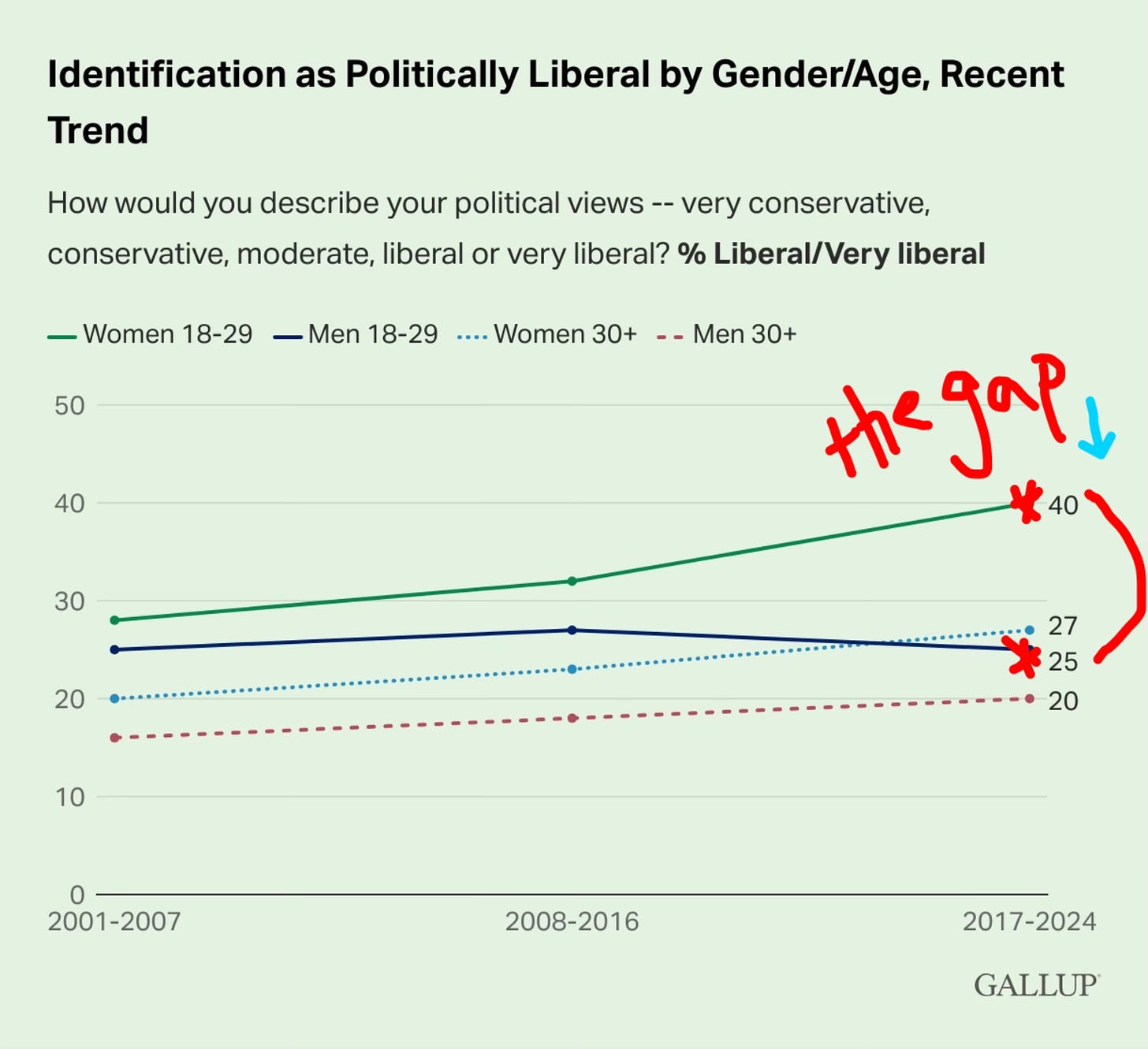"The Greta Effect" Is Still Effecting
climate's overlooked impact on the Gen Z political gender gap
Much has been made of Gen Z’s mile-wide political gender gap. It’s huge, historic and allegedly a war, conjuring battlefields of Theo Vons (ie, conservat-ish young men) and Charli xcxes (ie, liberal young witches).


None of it surprised me at first—reductive boys v girls media framing included. Women lean more liberal than men, period. In other words, the political gender gap extends across generations; it’s just that Gen Z’s gap is remarkably wide. Like, way-oversized linen pants that billow in the wind wide.
But to my eye, that gender gap doesn’t look like a gender war. With young women’s politics more liberal than the past 20 years minimum, it looks to me more like a walk-off.
What exactly is this political gender gap (and, yes, we will get to Greta)?
A key stat driving the headlines is that 40 percent of under-30 women politically identify as liberal, compared to 25 percent of men their age. Gallup attributes that 15-point difference to “stronger-than-average pro-liberal shifts” among Gen Z girlies, which is also mirrored in election polling. According to the latest Harvard Youth Poll, among 18-to-29-year-old likely voters, Harris is runaway favorite with 53% support from men* and a whopping 70% of women in that demo.
Meanwhile, young men’s conservat-ish political identification has barely changed since the 90s. Pollster Daniel Cox put it bluntly: “As women's political priorities have solidified, young men's priorities have melted into mush.” Bummer about the mush, but like the vanishing icebergs, we’ve watched it happen.
The 3 Issues Driving Young Women’s “Leftward Expansion”
My elder millennial brain assumed it was all abortion, and not no. Since 2016, the number of 18-to-29-year-old women who agree that abortion should be legal under any/most circumstances has risen 18 points to 60 percent.
Gun violence has pushed them leftward as well. Today, nearly three quarters of young women think gun laws should be stricter, compared to less than 60 percent in the Obama era.
But biggest contributor to Gen Z girlies’ liberal evolution?
CLIMATE CHANGE.
“After showing no change between the Bush and Obama eras,” Gallup reports, “the percentage of young women who agree that global warming is caused by human pollution rose 20 points to 86 percent.” Likewise, their support for prioritizing the environment over economic growth and belief that the US government is doing too little to protect the environment shot up 19 and 18 points, respectively.
In an election cycle where hurricanes have been weaponized as right-wing disinformation and meteorologists have been deluged with death threats from people now convinced they control the weather, Gen Z women’s environmental politics are a welcome contrast. And to me, they deserve more attention in this whole “gender war” discourse because they point to the power of what happens when a generation of girls gets activated.
Enter “The Greta Effect”
Circa 2019, sociologists coined “The Greta Effect” to describe Greta Thunberg’s potential influence on European countries’ climate policies. I only learned the term earlier this year while researching for a Conspiracy, She Wrote episode on the unhinged backlash to teenage Greta Thunberg’s global celebrity and influence.
“The Greta Effect has taken on a lot of different meanings over time,” scholar Emily Ryalls told me in the podcast interview. “The original Greta Effect was just that she seemed to influence so many people just to think even about what they could do in terms of environmentalism.”
For instance, studies have linked “The Greta Effect” to young people’s engagement with climate justice activism, as well as wider corporate adoption of carbon offset practices. Another identified a positive correlation between Greta-awareness and supporting collective action to reduce climate change. Ryalls has also observed it in her college classroom.
“I had a student say to me once, this was during COVID, that they were sort of born into a time where climate change is just all around them,” Ryalls said. “And she said, you know, we didn't think we would make it till 30. We really believed that kind of the environment was coming to an end, the climate, the world was going to end, you know? And so to see someone their age kind of stepping up and making this difference, I think really has been very inspirational to them.”
Admittedly, the concept sounded a little dusty to my ears at first (a la the Gen Z political gender gap, and am I the asshole?). Given our zero attention span culture and that it’s been five years since history’s largest climate protest, I was skeptical. Was “The Greta Effect” still relevant?
Now, judging by the polling data, my armchair answer is yes. (And no, it’s not all thanks to Greta.)
So what?
Gen Z women’s liberalism didn’t come out of this air. For years now, they’ve been keying up on the kinds of existential threats—reproductive rights, gun safety, climate justice—where there’s also real room for political change. And in a presidential election season drenched with cynicism and dangerous conspiracy theories, we need them mobilized more than ever. Like Gallup analyst Lydia Saad told the Associated Press in September, “You’ve got supermajorities of women holding these views [who are] primed to be activated to vote on these issues.”
If Democrats want to survive past November 6, they’d better take the girlies seriously before it’s too late for the party—and the planet.





Young women stepping up!! Love this (and, as a fellow millennial, hope to stand with them)!